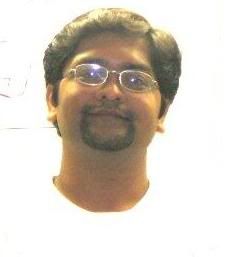Wednesday, March 30, 2005
Secular State
What does "Secular State" mean to us?!
Consider the fact that India which although majority Hindu still has the second largest Muslim population in the world. For most Muslims, the issue is more "theological" than "political" in nature; and, for the more radical Muslim groups, the term "secular state" is an oxymoron.
With the adoption of its constitution on November 26, 1949, India officially became a "sovereign socialist secular democratic republic." In accordance with this vision the constitution lays out numerous articles which guarantee both freedom of expression of religion and freedom from persecution on the basis of religion. Yet despite these noble aspirations India’s history has been tainted by repeated episodes of religious violence, intolerance and, according to many, governmental mismanagement.
While on the surface these conflicts appear to be isolated and localized many have accused both the federal government and various state governments, as well as political parties and nationwide advocacy groups of, at best standing idle while these conflicts spread and, at worst encouraging their propagation and intensification. These accusations and the questions that come with them have grown to an international scale in recent years with worldwide media attention, the involvement of international religious and human rights organizations, and negative attention from both the United States and the United Nations. By studying recent religiously motivated conflicts, the actors involved, and the political backdrop of these conflicts, we may see in what measure the political apparatus of India at both the state and federal levels is responsible for both provoking religious violence and intolerance, and for failing to stem its growth.
The Global Council of Indian Christians (GCIC) alleges that the Hindu fundamentalist groups of the Sangh Parivar, which include the Vishwa Hindu Parishad (VHP), the BJP, and the Bajrang Dal, have been responsible for the recent religious riots.
According to the Annual Report of the United States Commission on International Religious Freedom, "since 1998, there have been hundreds of attacks on Christian leaders, worshippers, and churches throughout India." The report also identified member organizations of the Sangh Parivar as being some of the primary instigators of violence, most notably the Sangh Parivar’s political wing, the BJP. The commission also gave significant mention of the February 2002 mob killings of fifty-eight Hindus on a commuter train by Muslims and the subsequent torture, rape, and killing of close to one thousand Muslims throughout Gurajat state and around the country. However, despite these occurrences, the commission recommended not to include India on the US State Department’s list of Countries of Particular Concern. Since the release of this report, the same commission has found some improvement in the situation in India with more improvement anticipated thanks to the election of the moderate United Progressive Alliance.Over the course of the past four odd years that I've been an avid reader of blogs and articles and columns on Sulekha, I've encountered inspiring and thought provoking pieces written by several contributors. Sometimes I found myself agreeing with their rationale, sometimes plain abhorring the ideas. I started writing some articles on spiritual topics, topics that were relevant to me, in my quest for knowledge.
With the rise of Hindutva, I am sure it is on the verge of taking us back at least a few decades. I hope that the more aggressive organizations like RSS realize how detrimental this is going to prove for our society.
Sometimes when I am sitting alone in my room, I think like a mournful optimist in the deafening silence of night and realize that I can only give out a silent scream, and I hear that rumbling deep inside and keep hoping that it’s like some demented dream. I guess that’s the price I shall have to pay.
Well it was adopted in the right spirit immediately and hence I said so accordingly; Although it obviously takes a little time to incorporate all the legalities and constitutional amendments for the completeness!!
Reply to Sujata's experience:
We don’t have to blame anybody for anything. We cannot change the inevitable. If you try not to annoy others, and try not to be agitated by the actions of others, well, that is about the best that can be done, but it will not keep you from experiencing the dark side of life, because, as is said, sh!t happens. But endure it with a smile !!
On a serious note, the only thing we can do is play on the one string we have, and that is our attitude. As you might have already heard the famous quote/ prayer: "God grant me the serenity to accept the things I cannot change, the courage to change the things I can, and the wisdom to know the difference."
Suffering is unique to each individual based on their perspective. For one a physical handicap is a mere inconvenience, while for another it is a mighty obstacle.
Identifying the true principles of a religion or philosophy could help us endure anything with a smile. Hence I am a proponent of scripture reading and have been stressing on the importance of reading religious scriptures rather than being misled by some so-called religious organizations. Further I cannot emphasize enough the importance of reading and realizing the true sense of any philosophy. Also realize that its easy to misinterpret individual passages and call it hypocrisy unless you read a chapter or topic as a whole in all its continuity & entirety.
<< Home







